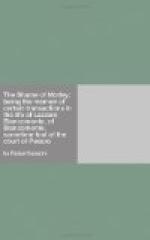The Lord Giovanni, himself not lacking in effeminacy, was greatly taken by the wondrous raiment, the studied lisp and the hundred affectations of this peerless gallant. Had he not been overburdened at the time by the Papal business that impended, he might there and then have cemented the intimacy which was later to spring up between them. As it was, he made him very welcome, and placed at his and his sister’s disposal the beautiful palace that his father had begun, and he, himself, had completed, which was known as the Palazza Sforza. On the morrow Giovanni left Pesaro with but a small retinue, in which I was thankful not to be included.
Two days later Madonna Lucrezia followed her husband, the fact that they journeyed not together, seeming to wear an ominous significance. Her eyes had a swollen look, such as attends much weeping, which afterwards I took as proof that she knew for what purpose she was going, and was moved to bitter grief at the act to which her ambitious family was constraining her.
After their departure things moved sluggishly at Pesaro. The nobles of the Lord Giovanni’s Court repaired to their several houses in the neighboring country, and save for the officers of the household the place became deserted.
Madonna Paola remained at the Sforza Palace, and I saw her only once during the two mouths that followed, and then it was about the streets, and she had little more than a greeting for me as she passed. At her side rode her brother, a splendid blaze of finery, falcon on wrist.
My days were spent in reading and reflection, for there was naught else to do. I might have gone my ways, had I so wished it, but something kept me there at Pesaro, curious to see the events with which the time was growing big.
We grew sadly stagnant during Lent, and what with the uneventful course of things, and the lean fare proscribed by Mother Church, it was a very dispirited Boccadoro that wandered aimlessly whither his dulling fancy took him. But in Holy Week, at last, we received an abrupt stir which set a whirlpool of excitement in the Dead Sea of our lives. It was the sudden reappearance of the Lord Giovanni.
He came alone, dust-stained and haggard, on a horse that dropped dead from exhaustion the moment Pesaro was reached, and in his pallid cheek and hollow eye we read the tale of some great fear and some disaster.
That night we heard the story of how he had performed the feat of riding all the way from Rome in four-and-twenty hours, fleeing for his life from the peril of assassination, of which Madonna Lucrezia had warned him.
He went off to his Castle of Gradara, where he shut himself up with the trouble we could but guess at, and so in Pesaro, that brief excitement spent, we stagnated once again.
I seemed an anomaly in so gloomy a place, and more than once did I think of departing and seeking out my poor old mother in her mountain home, contenting myself hereafter with labouring like any honest villano born to the soil. But there ever seemed to be a voice that bade me stay and wait, and the voice bore a suggestion of Madonna Paola. But why dissemble here? Why cast out hints of voices heard, supernatural in their flavour? The voice, I doubt not, was just my own inclination, which bade me hope that once again it might be mine to serve that lady.




